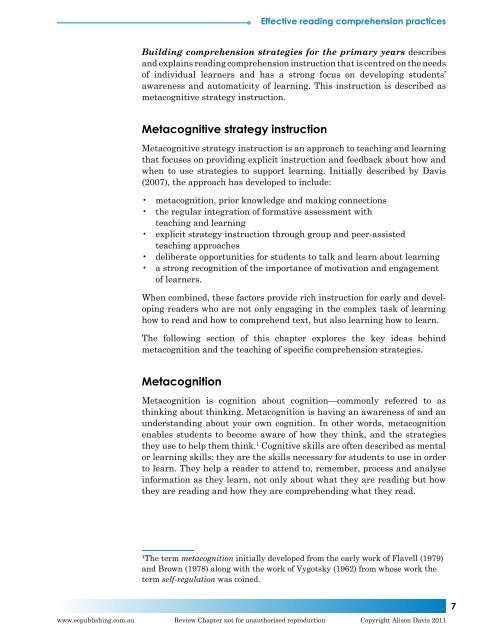Chapter 1: Effective reading comprehension practices (PDF)
Chapter 1: Effective reading comprehension practices (PDF)
Chapter 1: Effective reading comprehension practices (PDF)
Create successful ePaper yourself
Turn your PDF publications into a flip-book with our unique Google optimized e-Paper software.
<strong>Effective</strong> <strong>reading</strong> <strong>comprehension</strong> <strong>practices</strong>Building <strong>comprehension</strong> strategies for the primary years describesand explains <strong>reading</strong> <strong>comprehension</strong> instruction that is centred on the needsof individual learners and has a strong focus on developing students’awareness and automaticity of learning. This instruction is described asmetacognitive strategy instruction.Metacognitive strategy instructionMetacognitive strategy instruction is an approach to teaching and learningthat focuses on providing explicit instruction and feedback about how andwhen to use strategies to support learning. Initially described by Davis(2007), the approach has developed to include:• metacognition, prior knowledge and making connections• the regular integration of formative assessment withteaching and learning• explicit strategy instruction through group and peer-assistedteaching approaches• deliberate opportunities for students to talk and learn about learning• a strong recognition of the importance of motivation and engagementof learners.When combined, these factors provide rich instruction for early and developingreaders who are not only engaging in the complex task of learninghow to read and how to comprehend text, but also learning how to learn.The following section of this chapter explores the key ideas behindmetacognition and the teaching of specific <strong>comprehension</strong> strategies.MetacognitionMetacognition is cognition about cognition—commonly referred to asthinking about thinking. Metacognition is having an awareness of and anunderstanding about your own cognition. In other words, metacognitionenables students to become aware of how they think, and the strategiesthey use to help them think. 1 Cognitive skills are often described as mentalor learning skills; they are the skills necessary for students to use in orderto learn. They help a reader to attend to, remember, process and analyseinformation as they learn, not only about what they are <strong>reading</strong> but howthey are <strong>reading</strong> and how they are comprehending what they read.1The term metacognition initially developed from the early work of Flavell (1979)and Brown (1978) along with the work of Vygotsky (1962) from whose work theterm self-regulation was coined.7www.ecpublishing.com.au Review <strong>Chapter</strong> not for unauthorised reproduction Copyright Alison Davis 2011


